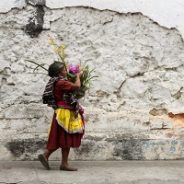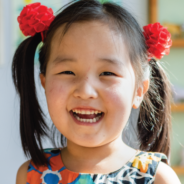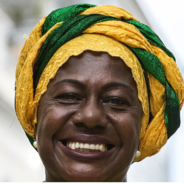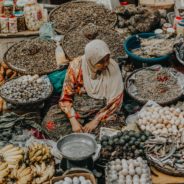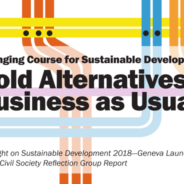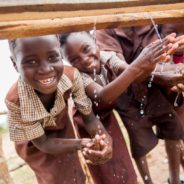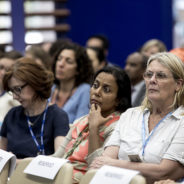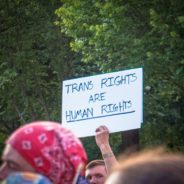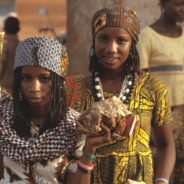Building Social Protection Systems: International Standards and Human Rights Instruments: Compendium
This compendium contains a selection of the most relevant international instruments that establish the human right to social security and provide guidance for comprehensive social security systems at national level. These include the standards and conclusions adopted by the International Labour Organization in the field of social security and the main human rights instruments spelling out the right to social security adopted under the auspices of the United Nations.
Ce compendium contient une sélection des instruments internationaux les plus pertinents qui établissent le droit humain à la sécurité sociale et des orienta-tions pour construire des systèmes complets de sécurité sociale au niveau national. Ceux-ci incluent les normes et conclusions adoptées par l’Organisation internationale du Travail dans le domaine de la sécurité sociale et les principaux instruments relatifs aux droits humains prévoyant le droit à la sécurité sociale adopté sous l’égide des Nations Unies.
Project “Towards Inclusive Social Protection Systems To Advance The Rights Of Persons With Disabilities” (2019-20)
Building on the process facilitated by ILO and International Disability Alliance (IDA) that led to the adoption of a joint statement on inclusive social protectionm and the current momentum on universal social protection, the UNPRPD funded project, implemented jointly by ILO and UNICEF in close cooperation with IDA seeks the collaborative development of capacity across countries, DPOs, development agencies and academia to support reforms towards inclusive social protection systems fostering inclusion and empowerment, in compliance with the UN Convention on the Rights of Persons with Disabilities (UNCRPD).
The main components of the project are:
- Collaborative production of thematic background papers reviewing recent or on-going reforms and proposing possible policy solutions to promote to disability inclusive social protection systems
- Contribution to mainstreaming disability-inclusive social protection in Inter-Agency Social Protection Assessment (ISPA) tools
- Joint learning with countries engaged in reform towards inclusive social protection through provision of technical assistance
- Support to effective DPO engagement in national dialogues on social protection strategies and policy reforms to make social protection systems more inclusive
- Development of technical guidance documents and training modules for inclusive social protection systems
See Concept Note
Toolkit on ILO Social Security Standards
The Toolkit on ILO Social Security Standards was developed with the aim of raising awareness about ILO social security standards and promoting their ratification as well as increasing their impact and application in national contexts. The toolkit provides very practical and useful insights as to the ratification procedure, model instruments of ratification as well as interactive information on the relevance and key provisions of these standards. Learn more.
ILO Resource Package on “Extending Social Security to Workers in the Informal Economy”
The ILO policy resource package “Extending social security to workers in the informal economy: Lessons from international experience” serves as a reference for policy makers, workers’ and employers’ organizations and other stakeholders engaged in the development of social protection strategies, or the planning, design, implementation and monitoring of systems and schemes. This practical tool can help in developing viable policy options to address the multi-fold challenges of extending social protection to workers in the informal economy and facilitating transitions to formality. It includes the following elements:
- Good practices guidebook
- Issue briefs on lessons learnt for specific categories of workers and topics
- Training materials
This policy resource package is intended to be a living toolkit. It will benefit from your feedback and inputs, especially from specific examples, experiences and resources that can be helpful for others. We welcome your suggestions – please get in touch.
Contacts: Christina Behrendt (behrendt@ilo.org) and Quynh Anh Nguyen (nguyenq@ilo.org)
Universal social protection for human dignity, social justice and sustainable development: General Survey concerning the Social Protection Floors Recommendation, 2012 (No. 202)
The ILO’s General Survey 2019 , compiled by the ILO Committee of Experts on the Application of Conventions and Recommendations (CEACR). The Survey (published under the title Universal social protection for human dignity, social justice and sustainable development) focuses on the ILO’s Social Protection Floors Recommendation, 2012 (No. 202), which calls for basic income security and essential healthcare guarantees from childhood to old age. It also aims to encourage greater levels of protection for as many people as possible, as soon as possible.
General Surveys are prepared annually by CEACR, the supervisory body in charge of monitoring ILO member States’ compliance with international labour standards. Each edition focuses on a subject chosen by the ILO’s Governing Body and takes an in-depth look at member States’ national law and practice in relation to it.
The General Survey 2019 is based on responses by 114 governments and observations submitted by employers’ and workers’ organizations. Survey participants responded to 46 questions on the implementation of Recommendation No. 202, which was the first international social protection standard of the 21st Century. Responses to the 2019 survey were analysed, good practices and obstacles were identified, and guidance offered to encourage better application of the Recommendation .
—
As the International Labour Organization (ILO) celebrates its Centenary, the Committee of Experts on the Applications of Conventions and Recommendations (hereinafter “the Committee”) is pleased to publish its General Survey on the implementation of the Social Protection Floors Recommendation, 2012 (No. 202) in national law and practice, pursuant to article 19 of the ILO Constitution. This General Survey is unique, being the first of such reports to focus on a single, stand-alone, Recommendation. This reflects the importance of social protection in the global development agenda and the relevance of the Recommendation in guiding action to combat poverty, inequality and social exclusion, and to achieve universal rights that together ensure life in health and dignity. On the occasion of the ILO’s 100th anniversary, this General Survey is the Committee’s contribution to the furtherance of universal social protection and social justice worldwide.
Recommendation No. 202 was adopted by near consensus in 2012 with a view to providing flexible and meaningful guidance to countries for the design, implementation and monitoring of social protection floors and social security extension strategies, aimed at progressively achieving universal social protection. Today, its guidance resonates with as much vibrancy as it did at the time of its adoption, with countries at all levels of income and stages of development engaged in developing their social protection system in line with the principles and recommendations it puts forward, as this Survey shows.
Based on reports provided by 114 governments and observations submitted by 11 employers’ and 44 workers’ organizations, and by one national labour council representing both workers and employers, this General Survey looks into the impact of the Recommendation at national and international level and provides guidance to enhance social protection in accordance with the Recommendation. More specifically, it highlights good practices and progress accomplished by countries in giving effect to the Recommendation, analyses the difficulties indicated by governments and social partners as impeding or delaying its implementation, identifies means of overcoming these obstacles and formulates practical recommendations for a better application of the Recommendation by ILO member States.
New Policy Brief on Social Protection for Youth by UN Women
Several countries, including the United States and the United Kingdom, recognize March as Women’s History Month. Both International Women’s Day and the Commission on the Status of Women, a 12-day forum dedicated to promoting gender equality and empowering women, take place during the month of March.
UN Women plays an important role in helping policy makers and practitioners ensue that social protection systems are gender-sensitive and transformative in their design in implementation. This year during Women’s History Month, the organization released a new policy paper, Gender and age-responsive social protection: The potential of cash transfers to advance adolescent rights and capabilities. This brief “reviews the effects of CTs on the rights and capabilities of adolescent girls and boys (10–19 years), using a gender and capability lens and focusing on three key capability domains: education, sexual and reproductive health, and freedom from violence”.
Download the brief here. Other policy papers in the series include:
• Making national social protection floors work for women,
• Gender equality, child development and job creation: How to reap the ‘triple dividend’ from early childhood education and care services,
• Protecting women’s income security in old age: Toward gender-responsive pension systems, and
• Making social protection gender-responsive: Lessons from UN Women’s work in the Eastern Caribbean.
They are available on the platform along with other social protection resources by UN Women.
Photo credit: Element5 Digital on Unsplash
UNRISD Hosted an Event during International Women’s Week
Technological and infrastructural innovations have profound impacts on the way society functions, affecting human rights in ways both positive and negative. On the one hand, new technologies can help provide access to education, improving outcomes for people who may otherwise find it difficult to enter the labour market. In the world of work, mobile apps like Uber, Grab, Airbnb and Innclusive can also offer people who may be struggling to find formal employment an alternative way to make money; in some cases using resources they already own and thus eliminating potentially costly start-up costs. On the other hand, while these new innovations provide income-generating opportunities, these jobs are often not enough to ensure a decent living standard and lack any social protection benefits.
On Thursday, 7 March, UNRISD hosted New Technologies and Human Rights: The Gender Dimension in Education and Work.
This event brought together experts from governments, civil society and international organizations to discuss solutions to the gendered challenges posed by new technologies.
Learn more by visiting the event page.
The event will be live-streamed on UNRISD’s Facebook page.
Photo credit: rawpixel on Unsplash.
Marco de referencia para aunar derechos humanos y protección social, disponible ahora en español
Gracias al apoyo de la Comisión Económica para América Latina y el Caribe (CEPAL), Social Protection and Human Rights se complace en anunciar a sus audiencias hispanohablantes la publicación del Marco de Referencia en español, disponible en https://socialprotection-humanrights.org/marco-de-referencia/
Los visitantes de la plataforma encontrarán también las versiones en español de los instrumentos legales y reportes relevantes bajo los principios fundamentales del enfoque de la protección social basado en los derechos humanos, tales como: la Declaración Universal de los Derechos Humanos (DUDH), el Pacto Internacional de Derechos Económicos, Sociales y Culturales (PIDESC), la Convención sobre los Derechos del Niño (CDN), la Convención sobre la Eliminación de Todas las Formas de Discriminación contra la Mujer, la Convención Internacional sobre Todas las Formas de Discriminación Racial, la Convención sobre los Derechos de las Personas con Discapacidad, la Recomendación sobre los pisos de protección social No 202 de la Organización Internacional del Trabajo (OIT), entre otros.
El marco de referencia es una guía útil para aquellos y aquellas que se dediquen a la investigación, la formulación de políticas y el desarrollo, y que deseen conocer en profundidad las obligaciones derivadas de leyes y normas vigentes de derechos humanos y su relevancia para el diseño, la implementación y la evaluación de programas de protección social.
Photo credit: “Antigua, Guatemala Street Scene” by Scott Umstattd via Unsplash.
ILO and UNICEF are Hosting an International Conference on Child Grants
The ILO, UNICEF and the Overseas Development Institute are hosting an International Conference on Universal Child Grants from 6-8 February in Geneva, Switzerland.
Universal child grants have the potential to help millions of children enjoy their right to social security and other related rights, including adequate food and nutrition, education, and housing. According to ILO’s 2017-19 World Social Protection Report, 4 billion people worldwide lack access to social protection; 1.3 billion of these being children.
Cash transfers are growing in popularity around the globe by governments who see it as part of a comprehensive social security system, while acknowledging that there is no one-size-fits- all solution: “Key issues around targeting and universalism, conditionality, policy financing, the positioning of cash transfer schemes within wider social and fiscal policy, variations in cash transfer core design features (such as the level of transfers, duration of participation) and their implications for policy impact on children’s outcomes and policy sustainability are widely debated”.
This conference brings together researchers, policy makers and practitioners to explore the arguments and evidence emerging from alternative cash transfer schemes, and promote informed policy debate and decision-making with regards to cash transfers, social protection and improving wider outcomes for children.
Some sessions will be live-streamed on socialprotection.org.
Photo credit: “A girl playing in kindergarten in Ulaanbaatar, Mongolia”. © UNICEF /UN0243366/Pasquall
The ILO is Co-Hosting a High-Level Conference on Social Protection in Geneva
On Tuesday, 5 February 2019, the Global Partnership for Universal Social Protection and the Organisation for Economic Cooperation and Development (OECD) are hosting a high-level conference, Together to achieve Universal Social Protection by 2030 at the ILO in Geneva, Switzerland.
The EU Social Protection Systems Initiative and the Global Coalition for Social Protection Floors are also co-hosts of the event.
According to the OECD event page,
Universal social protection (USP) is essential to the economic and social development of individuals, communities and nations. It is also a human right. We call on all countries to live up to their commitment to develop nationally owned social protection systems for all, including floors, as articulated in the Sustainable Development Goals in 2015.
The conference will be an opportunity to:
- showcase USP stories from champions and pioneers in developing countries
- encourage countries in the Global South to adopt the USP Call to Action
- hear what countries need from development partners to join the Global Partnership for Universal Social Protection (USP2030) to Achieve the Sustainable Development Goals
Governments, multilateral actors and all relevant national, regional and international organisations are invited to exchange on good practices and lessons learnt in delivering social protection to all, and to identify innovative approaches.
Find out more about the conference on the event page.
All sessions will be live-streamed on socialprotection.org.
Overcoming Inequalities in a Fractured World: UNRISD Conference
From 7-9 October, UNRISD is hosting Overcoming Inequalities in a Fractured World: Between Elite Power and Social Mobilization.
About the Conference
Inequalities are one of today’s greatest challenges, obstructing poverty reduction and sustainable development. Such disparities are catalysed by elite capture of economic and political power, a reinforcing process that compounds inequality, which—in its various dimensions—undermines social, environmental and economic sustainability, and fuels poverty, insecurity, crime and xenophobia.
As the power of elites grows and societal gaps widen, institutions representing the public good and universal values are increasingly disempowered or co-opted, and visions of social justice and equity side-lined. As a result, society is fracturing in ways that are becoming more and more tangible, with the growing divide between the privileged and the rest dramatically rearranging both macro structures and local lifeworlds.
The 2030 Agenda for Sustainable Development seeks to overcome such disparities, “leaving no one behind”. But how can this ambitious vision be achieved in the current climate, in which those in power act to protect the status quo from which they benefit? How can we build progressive alliances to drive the political and policy changes needed for an equitable, inclusive 21st century eco-social compact?
Panels
7 November
The conference kicks off on Wednesday, 7 November with a high-level panel discussion at the University of Geneva in the evening. Engines of Inequality? Elites, Power and Politics brings together thought leaders, influencers and advocates for change to discuss the growing influence of elite power and the deepening of global inequalities, and what can be done to counteract these trends.
The event is free and English to French translation.
8 November
The first full day of the conference opens with a plenary session, Inequality and Institutions:
Political Barriers to Transformative Change, followed by parallel sessions:
2a. Networks of Power in a Fractured World: The Role and Influence of Elites
2b. The Role of Institutions in Perpetuating or Curbing Inequalities
3a. Elite Ideology and Perceptions of Inequality: Implications for Redistribution and Social Cohesion
3b. Shifting Class Structures and Identities in the Age of Neoliberalism
9 November
The final day of the conference opens with a keynote address by Vandana Shiva, Oneness vs. The 1%, followed by parallel sessions:
4a. Cities for Whom? Causes and Consequences of Urban Socio-Spatial Inequalities
4b.Between Climate Justice and Social Exclusion: Towards an Eco-Social Approach
5a. Towards Transformative Public Policy: Undermining Elite Power through Local Collaboration and Social Mobilization
5b. Actors, Alliances and Strategies for a New Social Compact
The conference closes with The Politics of Transformative Change: UN and Civil Society Roundtable.
The complete programme is available on the UNRISD website. Select sessions will be live-streamed on UNRISD’s Facebook page.
Attendance is free, but registration is required. Registration is open until the end of the conference.
ESCAP Hosted a Regional Meeting on Ageing
The 2018 Asia-Pacific Regional Conference is taking place in Tehran from 23-25 October with the support of ESCAP (as well as Age International). Family, Community and State in Ageing Societies; hosted by UNFPA, HelpAge and the Government of the Islamic Republic of Iran; provides an opportunity to discuss how to address the problem of unprecedented, rapid ageing in the region. Traditionally, the family has been responsible for the care of older people, with intervention from the community and government when necessary. However, the pace of ageing, urbanization and migration (meaning that caregivers move away from their older family members) and increasing life spans mean that traditional arrangements are no longer sufficient to ensure older people can live in dignity.
Past policy discussions on the issue of social policies excluded the voices of older people, despite the right to participate in shaping policy and practice. The gender dimension of ageing — men tend to have shorter life spans than women, and many women have no entitlements to contributory pension schemes due to being employed in informal labour — must also be taken into account to ensure that policy and programmatic responses to the ageing population in Asia and the Pacific leave no one behind.
The expected outcomes of the Conference are:
- Greater understanding of how communities and governments can work together to support families facing challenges associated with rapid population ageing;
- Shared international experience in how countries shape their public policies, structures and services to adapt to demographic change;
- Wider and deeper networking among a range of organizations interested in ageing in the Asia-Pacific region and the Islamic Republic of Iran.
Photo credit: “Old woman selling at the market” by Firdaus Roslan (via Unsplash).
Launch of the 2018 Civil Society Reflection Group Report
On 18 September, UNRISD and Friedrich-Ebert-Stiftung Geneva will host the launch of the Civil Society Reflection Group on the 2030 Agenda for Sustainable Development‘s 2018 report. The report, Exploring New Policy Pathways: How to overcome obstacles and contradictions in the implementation of the 2030 Agenda, assesses progress towards the sustainable development agenda. The report’s overarching assessment is that “The world is off-track in terms of achieving sustainable development and fundamental policy changes are necessary to unleash the transformative potential of the SDGs”. When it comes to social protection in particular, the Group argues that “a huge gap… exists between the commitment to implement social protection systems and the current reality”.
The Civil Society Reflection Group was created in 2011 to offer independent analysis of international development policy. Since 2016, the Group has offered an annual assessment of the implementation of the SDGs, including social protection.
Download the 2016 and 2017 reports and visit the official event page to learn more and register.
ILO is Gearing Up for Its 100th Anniversary
2019, will mark the ILO’s 100th year of operation. As part of the ILO Centenary Initiatives, the Organization’s Social Protection Department (SOCPRO) has initiated a campaign: “100 years of social protection at the ILO: the road to universal social protection”. One of SOCPRO’s activities for the campaign was the collection of testimonies from social protection beneficiaries and people who are excluded, employers and employers’ associations, trade unions, governments, ILO staff and practitioners from social protection institutions.
In the run up to the organization’s 100th anniversary, the ILO is implementing seven Centenary Initiatives: the Future of Work, the End to Poverty, Women at Work, the Green Initiative, the Standards Initiative, the Enterprises Initiative and the Governance Initiative.
These initiatives are aimed at ensuring that the ILO will be able to successfully continue to work towards its mandate in the future — namely to ensure decent work for all in the future.
Photo credit: “Bardolina canvases” by Eddy Klaus (via Unsplash).
New UNICEF Report on WASH in Schools
On 28 August, the Joint Monitoring Programme for Water Supply, Sanitation and Hygiene (JMP) released Drinking Water, Sanitation and Hygiene in Schools: Global baseline report 2018. The JMP, comprised of UNICEF and WHO, has reported country, regional and global estimates of progress on drinking water, sanitation and hygiene (WASH) since 1990, and in 2015 developed a five-year strategy to enhance monitoring and realization of access to WASH globally.
To go along with the new report, the JMP has developed new service a new monitoring mechanism to enable schools to track progress in regards to providing access to water, sanitation and hygiene (WASH) and compare with other countries.
There are clear links between human rights-based social protection, water and sanitation, education and gender equality. The 2030 Agenda explicitly calls for universal access to WASH, social protection, gender equality and the empowerment of women and girls, and safe, inclusive and effecting learning environments.
To that end, this new report is the first comprehensive global assessment of WASH in schools and establishes a baseline for the sustainable development agenda. The JMP has also provided an online data visualization tool on the UNICEF website to allow stakeholders to easily compare progress towards achieving WASH in schools.
The global effort to achieve sanitation and water for all by 2030 is extending beyond the household to include institutional settings, such as schools, healthcare facilities and workplaces. This has been reinforced by global education for all strategies highlighting how water, sanitation and hygiene (WASH) in schools improves access to education and learning outcomes, particularly for girls, by providing a safe, inclusive and equitable learning environment for all.
Highlighting FAO’s Work on Social Protection
FAO, Social Protection and Human Rights’ partner of the month, works to achieve food security for all and to make sure people have regular access to enough high-quality food to lead active, healthy lives.
Social protection is an important element of FAO’s work. The organization’s three main goals are a) the eradication of hunger, food insecurity and malnutrition; b) the elimination of poverty and the driving forward of economic and social progress for all; and c) the sustainable management and utilization of natural resources, including land, water, air, climate and genetic resources for the benefit of present and future generations.
The 159th FAO Council took place last month in Rome. The Council exercises functions dealing with the world food and agriculture situation and related matters, as well as current and prospective activities of the Organization, such as its Programme of Work and Budget. On 4 June, the FAO hosted FAO’s Role in Social Protection: Innovation to Achieve Zero Hunger, Reduce Poverty and Build Resilient Communities, an official side event. The event brought together representatives from FAO’s partners in social protection to discuss important achievements made thus far – and the way forward – to continue to increase rural prosperity, food security and resilience through the scale-up of social protection systems. Click to see video and photos from the side event. The report from the Council session is available here.
FAO also has a series of policy papers on human rights-based social protection to address the worldwide gap in social protection coverage as it relates to food security and nutrition — 70 percent of the world’s population still lacks access. Watch Benjamin Davis, Interim Strategic Programme Leader of the FAO Strategic Programme on Rural Poverty Reduction and Natalia Winder Rossi, Social Protection Team Leader of the FAO Social Policies and Rural Institutions Division explain how enhancing social protection systems in rural areas can contribute to reducing poverty and ending hunger. Visit the FAO Policy Portal to learn more and access all of the policy papers.
Find other FAO resources related to a HRBA to social protection including infographics, policy papers, guidance notes and synthesis reports on the platform.
Photo credit: FAO (© via Flickr).
UNRISD is Hosting a Side Event at the 2018 HLPF
The 2018 High-Level Political Forum on Sustainable Development (HLPF) will take place from 9-18 July 2018 at the UN in New York. This year’s theme is Transformation towards sustainable and resilient societies.
UNRISD is hosting an official side event. The event, Localizing the SDGs through Social and Solidarity Economy for Sustainable and Resilient Societies, will bring together experts to share knowledge and experience on how SSE is contributing to realizing the 2030 Agenda’s vision of transformation, and achieving the goals and targets at the local level, in particular in cities.
The panellists include UNRISD Senior Research Coordinator Ilcheong Yi, who will present findings from UNRISD’s soon-to-be-concluded research project which explored the role of SSE in providing access to social protection, Social and Solidarity Economy for the SDGs: Spotlight on the Social Economy in Seoul. Experts from academia, civil society and governments will also be on the panel.
In addition, the HLPF will review progress on six of the SDGs:
- Goal 6. Ensure availability and sustainable management of water and sanitation for all
- Goal 7. Ensure access to affordable, reliable, sustainable and modern energy for all
- Goal 11. Make cities and human settlements inclusive, safe, resilient and sustainable
- Goal 12. Ensure sustainable consumption and production patterns
- Goal 15. Protect, restore and promote sustainable use of terrestrial ecosystems, sustainably manage forests, combat desertification, and halt and reverse land degradation and halt biodiversity loss
- Goal 17. Strengthen the means of implementation and revitalize the Global Partnership for Sustainable Development.
The HLPF, which meets every year for eight days, was established following the outcome document of the UN Conference on Sustainable Development (Rio+20), The Future We Want.
Listen to the podcast for UNRISD’s 2017 event, Refugee and Migrant Precarity: What Role for SSE?
Photo by Ian Valerio on Unsplash
UNRISD is hosting a side event at the 38th session of the Human Rights Council
On Tuesday, 19 June, UNRISD is hosting Where Do We Go from Here? Safeguarding Trans* People’s Rights. This meeting, an official side event of the 38th session of the Human Rights Council, will convene experts from international organizations, civil society and government to discuss the following questions:
- What good practices can be identified and lessons learned from efforts being made by national and local governments to ensure human rights for trans* people?
- Which parts of the 2030 Agenda for Sustainable Development can be, or are being, mobilized to ensure that people of all gender identities are able to enjoy the full range of human rights? Are there gaps in the Agenda that need to be closed by progressive policy making?
- What role can civil society play in ensuring that trans women, trans men, gender fluid and non-binary people are not left behind by the 2030 Agenda for Sustainable Development?
- How can social development research contribute to achieving trans* rights in the context of the 2030 Agenda for Sustainable Development?
- What are some of the successes and challenges in ensuring universal access to social protection, given diverse needs within populations?
This event is sponsored by the Human Rights and Integration Department at the Ministry for European Affairs and Equality, Republic of Malta.
Finland is Hosting an Expert Meeting on Care and Social Protection in Brussels
On 7 June, the Permanent Representative of Finland to the European Union (EU) is hosting Gender, Care Economy and Social Protection Systems – Structural transformations for reaching the SDGs. The event is being held as part of the work being done by the EU Social Protection Systems Programme (SPS). The EU-SPS is a four-year programme which supports low- and middle-income governments and institutional partners in developing inclusive, sustainable and human rights-based social protection systems. Partner countries include Cambodia, Mozambique and Zambia.
This event is in preparation for the 2019 Commission of the Status of Women (CSW63), led by UN Women. The theme for the CSW63 is Social protection systems, access to public services and sustainable infrastructure for gender equality and the empowerment of women and girls.
Gender transformative sustainable development can only be realized if the gender gap in unpaid care work addressed. This will mean going beyond the idea that social protection is limited to cash transfers and implementing the “triple-R famework”: recognizing, reducing and redistributing care work performed in the home and community. This event is an opportunity to bring experts from the fields of gender and the care economy, and human rights-based social protection to exchange ideas and good practices. Shahra Razavi from UN Women, Flora Myamba from Policy Research for Development (Tanzania) and Hisayo Katsui from the University of Helsinki will discuss how social protection systems can transform our world into one that values the abilities and contributions of all.
Learn more about social protection and unpaid care on our Key Issues page.
Photo by Bonnie Kittle on Unsplash
The High-Level Panel on Migration Took Place in Geneva
On 28 and 29 May, the United Nations Economic Commission for Africa (ECA) and the African Union held a Meeting of the High Level Panel on Migration (HLPM) at the International Organization for Migration (IOM) headquarters in Geneva. The Panel is made up of 16 experts from governments, the private sector, academia and civil society, and is chaired by Liberian President Ellen Johnson Sirleaf.
The Panel’s mandate is to provide African states and other relevant stakeholders with overall guidance and support on policy dialogues on international migration in Africa, taking into account the region’s specificities. To this end, HLPM met in January 2018 and will meet again in October. Members will also participate in the Intergovernmental Conference to Adopt the Global Compact for Safe, Orderly and Regular Migration in Morocco in December.
The HLPM contributes to building sound migration policy in Africa by:
- Supporting collaboration and cooperation among member States, regional economic communities, and international development partners to promote migrants’ rights and facilitate their movement, and reduce vulnerability of migrants, especially women;
- Supporting the production of migration-related knowledge for the conception of evidence-based migration policies and interventions;
- Supporting the engagement of the policy implication of the state of knowledge in determining the nature and patterns of inter, intra, and international migration streams in Africa;
- Assessing skilled migration both for countries of origin and of destination and the long-term implications of remittance flows for development; and
- Sensitizing policy makers to integrate migration into national plans and strategies.
Migrants face specific obstacles in being able enjoy their human right to social protection. They may have limited or no access to social protection in their country of residence due to status or nationality, while also being unable to claim their entitlements to social security benefits in their country of origin due to their absence.
According to some estimates, today 245 million people live outside their country of origin. The majority of migration by Africans takes place within Africa itself. As a result, policy related to social security will need to be comprehensive, coherent and coordinated, to ensure that people are able to enjoy their rights regardless of where they are.
Read the event concept note and agenda, and watch the opening session on YouTube. Find out more about the HLPM on the ECA website.


